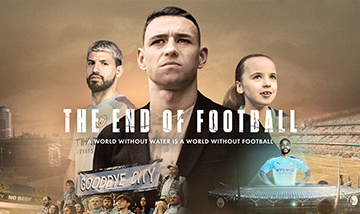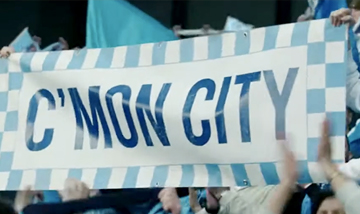From Tomb Raider to Water Crusader
"We wanted to underscore the seriousness of the problem. Water wastage is happening, and unless people take action there will be impacts within a generation."
Having directed Hollywood Blockbusters like Tomb Raider, The Wave and Escape, Roar Uthaug was not expecting his latest storytelling challenge…
The world’s full of noise. There are a million media outlets. Everyone’s a publisher. So how do you get your message across?
It’s a dilemma for any organization, but I have to say I was surprised by Xylem’s innovative thinking when they approached me to make a film about water sustainability. I admit, my industry has not been the most sustainable. I’ve been aware of water issues for some time – I directed a film called, “The Wave,” about a natural disaster, though I wasn’t as conscious of the growing problem of water scarcity. I’m from Norway, where water literally falls off the mountains!
But when partners Xylem and Manchester City, the 2018/2019 Premier League football champions, got together as co-producers and asked me to make a film about water scarcity, I was curious. Then when I learned more about the dangers ahead, I was hooked.
So what’s the film all about?
It illustrates what the future could be if we don’t take steps to protect the world’s depleting water resources. The UK Environmental Agency and other scientific bodies predict severe water shortages by 2045 and the film storyline highlights how this could impact the game we love: football. It follows a young fan – initially as a child, then we see her grown up. By the end of the story, her childhood hero football star Phil Foden has become manager of Man City (shown through special CGI effects in the film) – but he’s mourning “a sad day for football,” watching their last game. Water pricing is more dynamic with a bottle of water changing from £19 to £20 in a mere moment, and household water use is tracked daily. As the film title suggests, we’re facing “The End of Football.”
With every choice we made with the film, we wanted to underscore the seriousness of the problem – water wastage is happening all around us, and unless people take action there will be impacts within a generation. As a storyteller, this was a rich challenge. We had to look for ways to build a narrative that raised the stakes, and through special effects and time progression for example, we created that tension that makes audiences take notice.
It’s an unusual idea – teaming up with a football club to get people engaged about sustainability issues. But when you think about it, it’s a brilliant innovative idea too. Football’s the world’s favorite game – and film is the most powerful medium for engaging attention, making connections and getting an argument across.
We take it for granted that if you turn on a tap, an unlimited supply of clean water comes out. I certainly did, but not anymore.
But hang on. Isn’t this idea of water running out irrelevant to a developed nation? It sort of makes sense in hot desert countries, but the UK? It could sound like scaremongering.
I guess the other big question is … does a campaign like this work?
In just three weeks, the film was watched almost 11 million times and mentioned more than 165 times in the media. It struck a chord. The wider campaign has reached half a billion people, so important awareness on this topic continues to grow.
Xylem’s a business, but it’s also got a neat, simple mission – to “solve water.” That’s everything from making water more affordable and accessible, to protecting communities against severe weather. By using their association with one of the world’s most famous football clubs to raise these issues, they’re doing important work.
Work I’m proud to have supported.


 Norwegian born film and commercials director Roar Uthaug has always had a love for film. He graduated from the Norwegian National Film School in 2002. His debut feature film ‘Cold Prey’ won two Amanda awards, the Norwegian equivalent of the Oscars, for best actress and people’s choice. It then proceeded to sell to both the US and the UK and spawned two sequels. In 2017 he directed The Wave, Norway’s Best Foreign Film submission for the Oscars that year and, more recently, the 2018 reboot of Tomb Raider starring Alicia Vikander. He has shot commercials for several global brands including Panasonic, Doritos and Smart.
Norwegian born film and commercials director Roar Uthaug has always had a love for film. He graduated from the Norwegian National Film School in 2002. His debut feature film ‘Cold Prey’ won two Amanda awards, the Norwegian equivalent of the Oscars, for best actress and people’s choice. It then proceeded to sell to both the US and the UK and spawned two sequels. In 2017 he directed The Wave, Norway’s Best Foreign Film submission for the Oscars that year and, more recently, the 2018 reboot of Tomb Raider starring Alicia Vikander. He has shot commercials for several global brands including Panasonic, Doritos and Smart.



